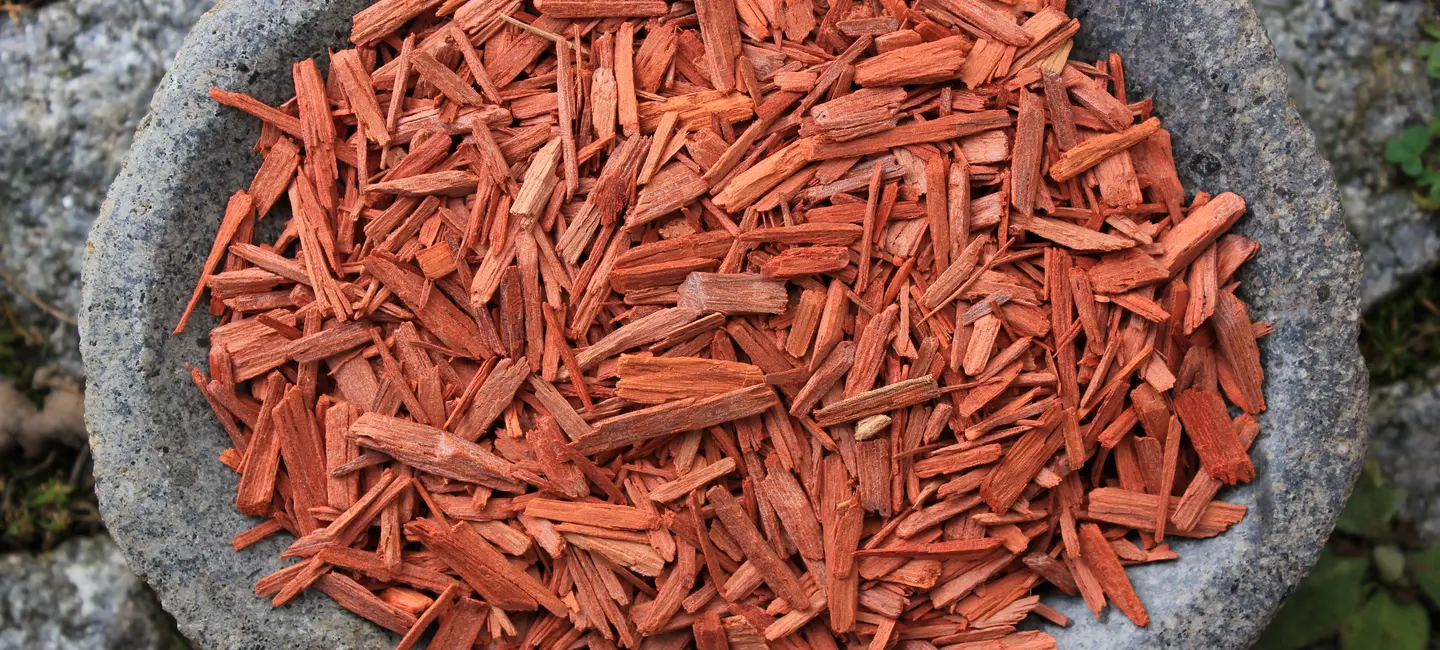
Red sandalwood is a tree. The wood at the center of the trunk (heartwood) and the bark are used as medicine.
People use red sandalwood for conditions such as cancer, wounds, digestive tract problems, fluid retention, and many others, but there is no good scientific evidence to support these uses.
In manufacturing, red sandalwood is used as a flavoring in alcoholic beverages.
Don't confuse red sandalwood (Pterocarpus santalinus) with white sandalwood (Santalum album).
Is It Effective?
There is interest in using red sandalwood for a number of purposes, but there isn't enough reliable information to say whether it might be helpful.
Is it Safe?
Red sandalwood might increase the loss of body water through the urine (diuretic effect). It might also have drying effects that may help with wounds, diarrhea, and coughs.
When taken by mouth: Red sandalwood is LIKELY SAFE when used in amounts found in foods. There isn't enough reliable information to know if red sandalwood is safe to use as a medicine or what the side effects might be.
When applied to the skin: There isn't enough reliable information to know if red sandalwood is safe or what the side effects might be.
Special Precautions & Warnings:
Pregnancy and breast-feeding: There isn't enough reliable information to know if red sandalwood is safe to use when pregnant or breast-feeding. Stay on the safe side and avoid use.
Lithium
Interaction Rating=Moderate Be cautious with this combination.
Red sandalwood might have an effect like a water pill or "diuretic." Taking red sandalwood might decrease how well the body gets rid of lithium. This could increase how much lithium is in the body and result in serious side effects. Talk with your healthcare provider before using this product if you are taking lithium. Your lithium dose might need to be changed.
Medications for diabetes (Antidiabetes drugs)
Interaction Rating=Moderate Be cautious with this combination.
Red sandalwood extract might decrease blood sugar. Diabetes medications are also used to lower blood sugar. Taking red sandalwood extract along with diabetes medications might cause your blood sugar to go too low. Monitor your blood sugar closely. The dose of your diabetes medication might need to be changed.
Some medications used for diabetes include glimepiride (Amaryl), glyburide (DiaBeta, Glynase PresTab, Micronase), insulin, pioglitazone (Actos), rosiglitazone (Avandia), chlorpropamide (Diabinese), glipizide (Glucotrol), and tolbutamide (Orinase).
Herbs and supplements that might lower blood sugar: Red sandalwood extract might lower blood sugar. Taking red sandalwood extract along with other herbs or supplements that have the same effect might cause blood sugar to drop too low in some people. Some of these herbs include devil's claw, fenugreek, guar gum, Panax ginseng, and Siberian ginseng.
There are no known interactions with foods.
The appropriate dose of red sandalwood depends on several factors such as the user's age, health, and several other conditions. At this time there is not enough scientific information to determine an appropriate range of doses for red sandalwood. Keep in mind that natural products are not always necessarily safe and dosages can be important. Be sure to follow relevant directions on product labels and consult your pharmacist or physician or other healthcare professional before using.
Bois de Santal Rouge, Pterocarpus santalinus, Rakta Chandan, Red Sanders, Red Sanderswood, Red Saunders, Red Saunderswood, Rubywood, Sándalo Rojo, Sandalwood Padauk, Santal Rouge, Santali Lignum Rubrum, Santalum Rubrum, Sappan.
Information on this website is for informational use only and is not intended to replace professional medical advice, diagnosis, or treatment. While evidence-based, it is not guaranteed to be error-free and is not intended to meet any particular user’s needs or requirements or to cover all possible uses, safety concerns, interactions, outcomes, or adverse effects. Always check with your doctor or other medical professional before making healthcare decisions (including taking any medication) and do not delay or disregard seeking medical advice or treatment based on any information displayed on this website.
© TRC Healthcare 2024. All rights reserved. Use and/or distribution is permitted only pursuant to a valid license or other permission from TRC Healthcare.
